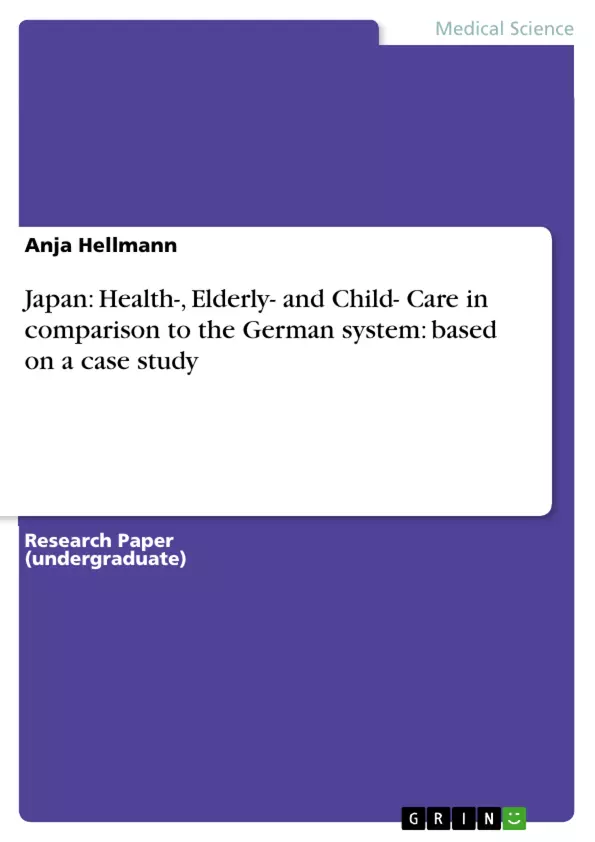The development of the Japanese society is characterized by a lot of similarities to Germany. This is why I have chosen the country to compare especially the Health Care System with the German one.
Not only the economic achievements are comparable, but first of all the Demographic Change. In 2020 28% of the Japanese population will be over 65 years. In Germany it is prognosticated to be around 21% (Tab.1).
Moreover the Japanese Health Care System is known as own of the cheapest of the industrialized countries. This leads to the question of adoption of some parts or ideas from the Japanese system to the German one.
In my elaboration I want to describe a case of a family in Japan regarding the family and work situation, the Health Care System in general and additionally the system of taking care of the elderly and the children.
My example family has got following parts:
The mother is 42 years old, she works as a nurse in an outpatient department of a local government. In addition she has to take care of her parents almost every day. The father is 45 years old, works as an engineer and likes his hobby, which is driving motorbikes. The daughter of them is 7 and their son is 13, both go to school. The grandmother has got dementia, she is 76 years old and lives together with her husband, who is 76 and has got diabetes. They live in the neighborhood of their children and grandchildren.
Case 1: Values, culture, roles of the family members.
Case 2: Health Care System of Japan in comparison to the German one. What happens after a traffic accident of the father?
Case 3: Elderly and Child Care in general and in the case of the accident and depression of the mother.
Inhaltsverzeichnis (Table of Contents)
- INTRODUCTION
- CASE 1
- HOME FACILITIES/AREA WHERE THE FAMILY IS LIVING
- CULTURAL VALUES/ RELIGION
- RELATIONSHIPS/Roles in the famILY
- Domestic situation
- Male-Female Relations
- Values of the family
- CASE 2
- HEALTH CARE SYSTEM OF JAPAN
- History
- Insurances
- Financing System
- Hospitals and doctors
- Costs for services
- Problems and aims
- CASE 3
- ELDERLY CARE
- Demographic Change
- The "Gold plans"
- The long-term care insurance system
- CHILD CARE
- CONCLUSION
Zielsetzung und Themenschwerpunkte (Objectives and Key Themes)
This paper aims to compare the Japanese health care system with the German system, focusing on demographic changes, cultural values, and the family structure. It also explores the specific situation of a hypothetical family in Japan and examines their experiences within the health care system, particularly in cases of illness or accident. The paper also examines elderly and child care within this context.- Comparative Analysis of Health Care Systems: Germany vs. Japan
- Cultural and Societal Influences on Health and Family Life
- The Impact of Demographic Change on Health Care and Social Welfare
- Family Dynamics and Roles in Japanese Society
- Elderly and Child Care within the Japanese System
Zusammenfassung der Kapitel (Chapter Summaries)
Case 1: Values, Culture, roles of the family members.
This chapter explores the social and cultural context of the Japanese family, focusing on the cultural values, religious beliefs, and family roles. It highlights the historical development of family structures and the influence of Confucianism. This chapter analyzes the changing domestic situation, the impact of consumerism, and the blending of traditional and modern elements in Japanese society.Case 2: Health Care System of Japan in comparison to the German one. What happens after a traffic accident of the father?
This chapter provides a comparative analysis of the Japanese and German healthcare systems, focusing on their history, financing, insurance systems, and the availability of services. The chapter examines the challenges and objectives of both systems, utilizing the hypothetical case of a father experiencing a traffic accident to illustrate the practical application of the Japanese system.Case 3: Elderly and Child Care in general and in the case of the accident and depression of the mother in the family.
This chapter explores the Japanese systems for elderly and child care, discussing demographic changes, the "Gold plans," and the long-term care insurance system. The chapter analyzes the impact of the mother's accident and potential depression on the family dynamics, including the challenges of caring for both elderly parents and young children.Schlüsselwörter (Keywords)
This work explores key concepts such as health care systems, demographic change, cultural values, family dynamics, elderly care, child care, and social welfare in the context of Japan and its comparison to Germany. The paper utilizes specific case studies and real-world scenarios to illustrate the practical application of these concepts and their implications for individual families and society as a whole.Frequently Asked Questions
How does the Japanese health care system compare to Germany's?
Both countries face similar challenges like demographic change, but Japan's system is noted for being one of the most cost-effective among industrialized nations.
What is the impact of demographic change in Japan?
By 2020, 28% of the Japanese population was projected to be over 65, necessitating robust systems for elderly care and long-term insurance.
What are the "Gold Plans" in Japan?
The Gold Plans are strategic government initiatives aimed at improving social welfare and infrastructure for the aging population.
How is child care structured in Japan?
The paper examines child care within the context of family roles, where modern demands often conflict with traditional expectations of parental care.
What role does Confucianism play in Japanese family dynamics?
Traditional values influenced by Confucianism emphasize respect for elders and specific family roles, which still influence how care is provided within the household.
- Quote paper
- Anja Hellmann (Author), 2009, Japan: Health-, Elderly- and Child- Care in comparison to the German system: based on a case study, Munich, GRIN Verlag, https://www.grin.com/document/149799



